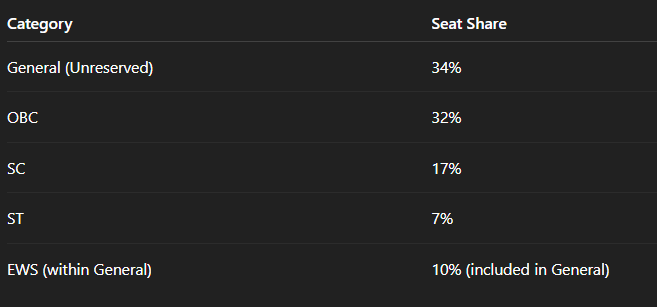India's reservation system is often painted in binaries: reserved vs. unreserved, merit vs. quota. But the true picture is far more complex—and far more unfair to the very communities reservations are meant to uplift.
Recent data from the Karnataka caste survey—the most detailed since the 1931 British census—reveals something shocking: the Other Backward Classes (OBCs), despite being the largest social group, are vastly underrepresented in the actual seats reserved for them.
🔍 The Numbers: What the Karnataka Caste Survey Revealed
The Socio-Economic and Educational Survey (2015), submitted in 2023 by the Karnataka State Commission for Backward Classes, estimated the population composition of the state as:
This means OBCs alone form the overwhelming majority of Karnataka’s population.
🎯 But What About Seat Allocation?
Let’s look at how government jobs and education seats are allocated in Karnataka:
The Real Shock: Seat-to-Population Ratio
By comparing each group's share of seats with their share of population, we get the seat-per-capita ratio—a clear indicator of how much competition a member of that category faces.
This means:
-
General category candidates have almost 7× more seats per capita than their population share. Their competition is the lowest.
-
OBCs, despite being the largest group, have less than half the seats they proportionally deserve.
-
SC/ST categories, while historically disadvantaged, now receive seats roughly in proportion to their population.
🧠 What Does This Really Mean?
It means OBCs are fighting for crumbs on their own table. A student or job aspirant from an OBC background faces nearly double the competition as an SC/ST counterpart—and more than 13× the competition faced by someone from an unreserved (General) caste.
And yet, public discourse often portrays OBCs as having an “easy ride” due to reservations. The numbers say otherwise.
❓ Why Is This Happening?
-
Cap on total reservation: The Supreme Court has historically capped reservations at 50% (though Karnataka exceeds this), meaning even large groups like OBCs can’t get proportional seats.
-
No proportional quotas: Reservations aren’t based on current caste population data (except in Tamil Nadu and now Bihar).
-
General category advantages: The General category, which includes dominant castes, ends up with a disproportionate share despite being numerically tiny.
🔁 What Needs to Change?
-
Make caste census data public across India
-
Base reservation percentages on actual population share
-
Sub-categorize OBCs so that dominant OBCs don’t crowd out marginalized ones
-
Include seat-to-population ratio in policy-making
⚖️ Final Thought
The reservation debate often turns emotional, but data helps us see clearly. And the data is unambiguous:
The biggest victims of India’s flawed reservation system are often those it claims to empower: the OBCs.
It’s time to recalibrate the system—not against one group, but in favor of justice, logic, and equality.


